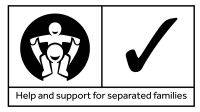{loadposition article-advertise} Divorce or separation is not simply a matter of deciding to stop living with each other. This is especially so when you have children. We offer you some suggestions about the kind of things that you will need to reach agreement on.
Q: How should we reach agreement?
Without doubt, reaching agreement through discussion and compromise is the best way forward. If you can arrange things without going through the court process you will find it:
- less stressful for your children
- less stressful for you and your child’s mum
- quicker
- cheaper
- more enduring
It will also make your children feel more emotionally contained and reassure them that they can rely on their parents to remain stable. It also models a co-operative adult relationship, something they will draw on in their own adult life.
If you need some help in reaching agreement, you could use a trained mediator. You may also wish to consult a solicitor in order to get some background legal information.
Mediation: agreeing without the courts
Q: What do we need to agree on?
There are a few key things that most couples need to agree on when they decide to separate:
- child arrangements
- the division of assets including property, savings and pensions
- spousal maintenance
- child maintenance
Q: How do we reach agreement about child arrangements?
Except in extreme cases, it is important that children spend time with both of their parents. This helps them to adjust to the new situation and provides the input that they need to internalise a secure attachment to their mum and dad allowing them to grow with a sense of emotional security.
Remember that what counts in child arrangements is quality not quantity. You should use your child’s pre-divorce care patterns as a guide to agreeing new arrangements.
Q: How do we reach agreement about parenting input?
Parenting input is the way that you will make decisions about your child’s wellbeing. You may need to make arrangements to agree things such as diets, religious upbringing, schools, bed times, ways of guiding behaviour and even hours spent on the computer.
Q: How do we reach agreement about housing?
You will need to consider not only your own housing needs but the needs of your child or children. It is therefore a good idea to agree child arrangements before deciding what you are going to do about housing.
You may wish your child to remain in the family home if care will mostly be provided by one parent. Alternatively, you may need to sell the family home in order to provide two suitable homes where ongoing care will be more evenly shared.
Q: How do we reach agreement about the division of assets?
If your relationship with your child’s mum is going to remain co-operative and constructive, then it is important to make the division of assets as fair as possible. It is also important to take into consideration the ongoing financial security of your children.
Q: How do we reach agreement about financial maintenance?
Financial maintenance breaks down into two possible elements. A potential need to provide maintenance for your child’s mum and the need for your child to be provided for financially. You may need to talk to a mediator or a solicitor when agreeing maintenance.
The Child Maintenance Service will also be able to rule on the level of child maintenance. Again, a mediator or solicitor will also be able to help. It is important that you make arrangements that don’t disadvantage your child when they are with you or their mum.
About the author
Clare Kirby qualified as a lawyer in 1983 and worked for several years in industry. She founded Kirby & Co in 1997. As a member of Resolution and an advanced member of the Law Society’s Family Law Panel she is experienced and respected in the field of family law. Trained as a collaborative lawyer, Clare offers clients a range of options – traditional, and collaborative law – to best meet the needs of the individual clients.
Updated: February 2018









